初中英语易错易混词汇和短语辨析(三)
九年级英语易混淆知识点
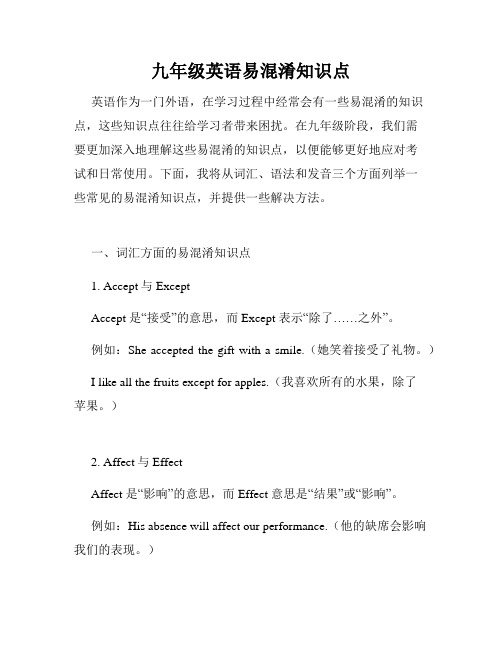
九年级英语易混淆知识点英语作为一门外语,在学习过程中经常会有一些易混淆的知识点,这些知识点往往给学习者带来困扰。
在九年级阶段,我们需要更加深入地理解这些易混淆的知识点,以便能够更好地应对考试和日常使用。
下面,我将从词汇、语法和发音三个方面列举一些常见的易混淆知识点,并提供一些解决方法。
一、词汇方面的易混淆知识点1. Accept与ExceptAccept 是“接受”的意思,而Except 表示“除了……之外”。
例如:She accepted the gift with a smile.(她笑着接受了礼物。
)I like all the fruits except for apples.(我喜欢所有的水果,除了苹果。
)2. Affect与EffectAffect 是“影响”的意思,而Effect 意思是“结果”或“影响”。
例如:His absence will affect our performance.(他的缺席会影响我们的表现。
)The medicine had a positive effect on her health.(这种药对她的健康有积极的影响。
)3. Desert与DessertDesert 是“沙漠”的意思,而Dessert 表示“甜点”。
例如:They took a trip to the desert.(他们去沙漠旅行了。
)I want some ice cream for dessert.(我想要一些冰淇淋当甜点。
)二、语法方面的易混淆知识点1. Much与ManyMuch 用于不可数名词,而Many 用于可数名词。
例如:He has much experience in this field.(他在这个领域有很多经验。
)There are many books on the shelf.(书架上有很多书。
)2. It's与ItsIt's 是 It is 或 It has 的缩写形式,而Its 是“它的”的意思。
人教版八年级英语下册各单元易混淆单词和短语辨析汇总(整册)
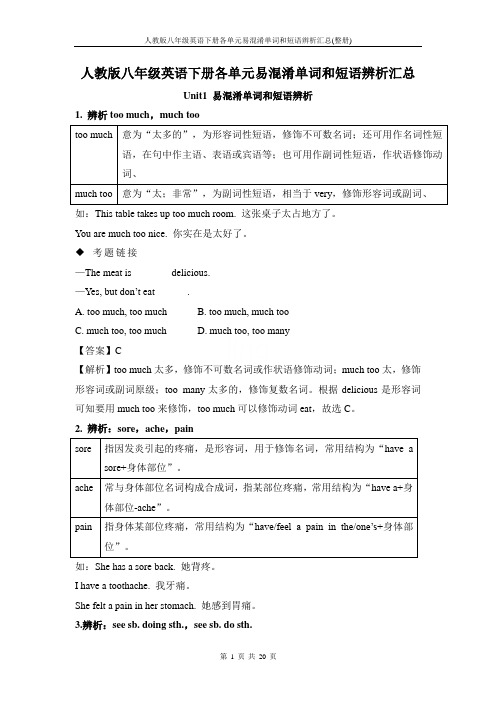
人教版八年级英语下册各单元易混淆单词和短语辨析汇总Unit1 易混淆单词和短语辨析1. 辨析too much,much too如:This table takes up too much room. 这张桌子太占地方了。
You are much too nice. 你实在是太好了。
考题链接—The meat is _______ delicious.—Yes, but don’t eat ______.A. too much, too muchB. too much, much tooC. much too, too muchD. much too, too many【答案】C【解析】too much太多,修饰不可数名词或作状语修饰动词;much too太,修饰形容词或副词原级;too many太多的,修饰复数名词。
根据delicious是形容词可知要用much too来修饰,too much可以修饰动词eat,故选C。
2. 辨析:sore,ache,pain如:She has a sore back. 她背疼。
I have a toothache. 我牙痛。
She felt a pain in her stomach. 她感到胃痛。
3.辨析:see sb. doing sth.,see sb. do sth.如:We saw him crossing the road.我们看见他正在过马路。
We saw him cross the road.我们看见他过马路了。
考题链接1. I saw them ________(play) basketball on the playground when I passed by.2. I often see him ________(play) table tennis with his son on the playground. 【答案】1. playing 2. play4. 辨析:expect,wish,hopeI wish I would fly. 我要是能飞就好了。
鲁教版七年级下英语各单元易混淆词汇及短语辨析
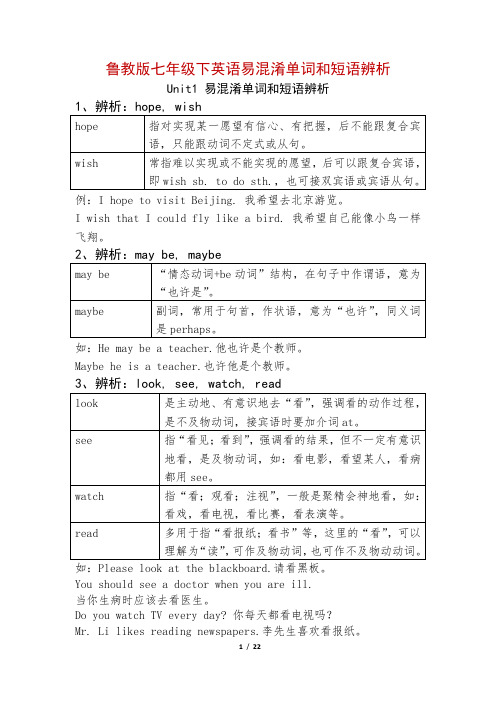
鲁教版七年级下英语易混淆单词和短语辨析Unit1 易混淆单词和短语辨析例:I hope to visit Beijing. 我希望去北京游览。
I wish that I could fly like a bird. 我希望自己能像小鸟一样飞翔。
如:He may be a teacher.他也许是个教师。
Maybe he is a teacher.也许他是个教师。
如:Please look at the blackboard.请看黑板。
You should see a doctor when you are ill.当你生病时应该去看医生。
Do you watch TV every day? 你每天都看电视吗?Mr. Li likes reading newspapers.李先生喜欢看报纸。
4、辨析: happen, take place例:A funny thing happened in the subway yesterday.昨天地铁里发生了一件有趣的事。
Great changes took place in my hometown last year.去年我的家乡发生了巨大的变化。
5、辨析:let’s, let us如:Let’s go to school, Darning.大明,我们去上学吧。
(提出建议,双方参与)Let us go home, Mr Wang.王老师,让我们回家吧。
(请求允许,不包括王老师在内)6、辨析:one day, some day, the other day如:One day, the monkey saw a villager.一天,那只猴子看见了一个村民。
China dream will come true one some day.总有一天中国梦会实现。
I asked the car the other day.几天前我叫过车。
7、辨析:be famous for, be famous as例:Beijing is famous for its many places of interest in the world.北京以其众多的名胜古迹而闻名于世。
中考英语78个易混易错单词、短语、句型
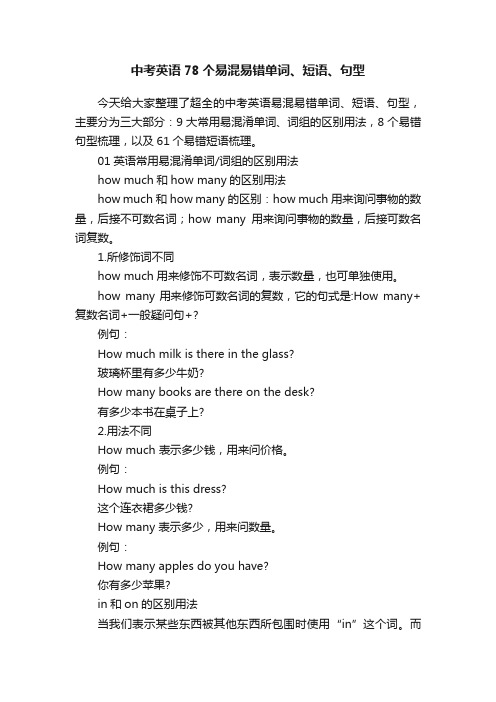
中考英语78个易混易错单词、短语、句型今天给大家整理了超全的中考英语易混易错单词、短语、句型,主要分为三大部分:9大常用易混淆单词、词组的区别用法,8个易错句型梳理,以及61个易错短语梳理。
01英语常用易混淆单词/词组的区别用法how much和how many的区别用法how much和how many的区别:how much用来询问事物的数量,后接不可数名词;how many用来询问事物的数量,后接可数名词复数。
1.所修饰词不同how much用来修饰不可数名词,表示数量,也可单独使用。
how many用来修饰可数名词的复数,它的句式是:How many+复数名词+一般疑问句+?例句:How much milk is there in the glass?玻璃杯里有多少牛奶?How many books are there on the desk?有多少本书在桌子上?2.用法不同How much 表示多少钱,用来问价格。
例句:How much is this dress?这个连衣裙多少钱?How many 表示多少,用来问数量。
例句:How many apples do you have?你有多少苹果?in和on的区别用法当我们表示某些东西被其他东西所包围时使用“in”这个词。
而“on”用于描述物体被放置在其他物体上方或外部的情况。
in可表时间,表地点,表手段、方法、材料。
on表示时间、地点、方位等。
1.意思不同in:prep.在 ... 里;在 ... 地方;在 ... 期间on:prep.在 ... 之上2.用法不同in:in着重一段时间的过程,常用于重复动作或延续动作。
in表示从现在时间算起推移到将来的一段时间之后,一般与将来时态连用。
例句:He is a layman in economics.他对经济学一窍不通。
on:表示“在物体的表面上”,只能用on的表达方式有on the next morning,on the following。
易混易错词语辨析
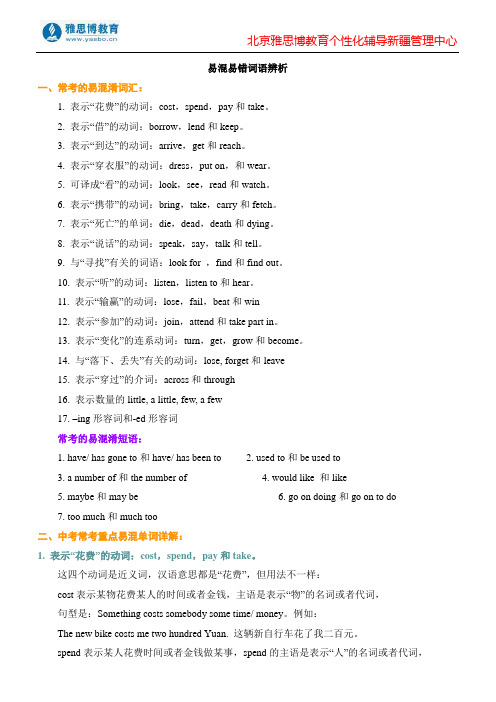
易混易错词语辨析一、常考的易混淆词汇:1. 表示―花费‖的动词:cost,spend,pay和take。
2. 表示―借‖的动词:borrow,lend和keep。
3. 表示―到达‖的动词:arrive,get和reach。
4. 表示―穿衣服‖的动词:dress,put on,和wear。
5. 可译成―看‖的动词:look,see,read和watch。
6. 表示―携带‖的动词:bring,take,carry和fetch。
7. 表示―死亡‖的单词:die,dead,death和dying。
8. 表示―说话‖的动词:speak,say,talk和tell。
9. 与―寻找‖有关的词语:look for ,find和find out。
10. 表示―听‖的动词:listen,listen to和hear。
11. 表示―输赢‖的动词:lose,fail,beat和win12. 表示―参加‖的动词:join,attend和take part in。
13. 表示―变化‖的连系动词:turn,get,grow和become。
14. 与―落下、丢失‖有关的动词:lose, forget和leave15. 表示―穿过‖的介词:across和through16. 表示数量的little, a little, few, a few17. –ing形容词和-ed形容词常考的易混淆短语:1. have/ has gone to和have/ has been to2. used to和be used to3. a number of和the number of4. would like 和like5. maybe和may be6. go on doing和go on to do7. too much和much too二、中考常考重点易混单词详解:1. 表示“花费”的动词:cost,spend,pay和take。
这四个动词是近义词,汉语意思都是―花费‖,但用法不一样:cost表示某物花费某人的时间或者金钱,主语是表示―物‖的名词或者代词,句型是:Something costs somebody some time/ money。
人教版九年级英语各单元易混易错词义辨析汇总

Unit1 易混易错词义辨析汇总1、aloud, loud与loudly2、discover与invent3、by, with, in, through与use4、instead与instead ofUnit2 易错易混词义辨析汇总1、dead, die, death与dying2、like, love与enjoy3、bring, carry, fetch与takeUnit3 易混淆单词和短语辨析1、辨析: beside, besides例:The bookstore is on your right, beside the bank.书店在你的右边,银行旁边。
Besides English, we learn Japanese as well.除了英语,我们还学日语。
2、辨析:between, among例:Between the door and the window there is a map. 门和窗户的中间有一张地图。
He sat among the children. 他坐在孩子们中间。
3、辨析:excuse me, sorry, pardon例:Excuse me, may I use your bicycle, Jack?对不起,我可以用一下你的自行车吗,杰克?I’m sorry. I can’t go to the cinema with you this afternoon.对不起。
我今天下午不能和你一起去看电影。
一Answer the question in English.请用英语回答这个问题。
一Pardon?对不起,请再说一遍。
4、辨析:on one’s way to, in a way, by the way, in the way例:I met an old friend of mine on my way to the station.在去车站的途中,我碰见了我的一位老朋友。
初中英语300组常用词语辨析(3)

初中英语300组常用词语辨析(3)§201grow / keep / raise / plantⅠ. grow & plant 都可表示“种植”如种植草、树、苗、花卉粮食等植物。
grow 着重指种植以后的栽培、管理过程。
plant 着重指“种植”这一行为。
某人plant a tree 之后,树是死是活,不一定管,但某人grow a tree 则包括培育管理,使其生长的过程。
如:① The students are planting trees on the hill. 学生们正在山坡上栽树。
(不用grow ) ② The farmer grows wheat in this field.那位农民在这块田里种植小麦。
(不用plant ) ③ People grow bananas in Hainan. 海南种植香蕉。
(不用plant )Ⅱ. keep 表“赡养”后可接表人或动物的名词,不用来代替plant 或grow. 如: He has a wife and three children to keep. 他要养活妻子和三个孩子。
Ⅲ. raise 除表“饲养(动物)”以外,还可表示“教育(子女)”; “培育(植物)”。
如: Where were you raised ? 你在哪儿长大?[注]:raise 强调从小精心培养到大,通常指培养花卉以及较难管理的植物。
如:Let ’s grow / raise some flowers in the garden.咱们在园子里种些花吧。
We grow rice, wheat and cotton in my hometown. 在家乡,我们种植水稻、小麦和棉花。
(不宜用raise )§202 glad/ happy/merry/ pleased 这组形容词都有:“高兴、快乐”之意。
Ⅰ.glad 多用在与人见面时的客套语中,指使人感到:情绪上有短暂的喜悦,常用作表语,一般情况下不作定语。
外研版七年级下英语易混淆单词和短语辨析
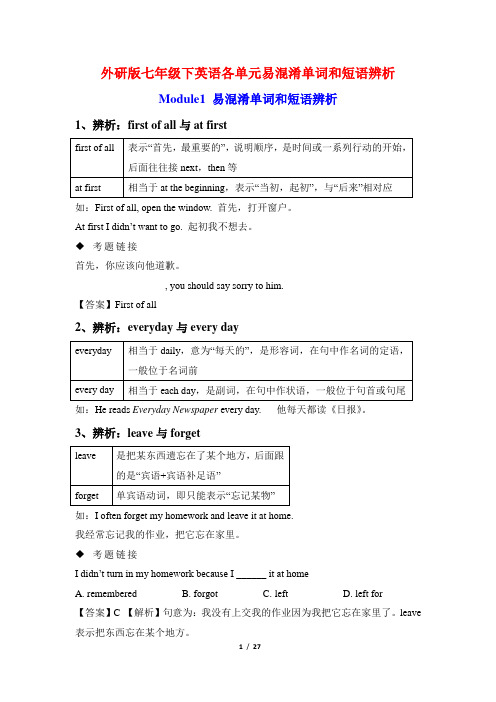
外研版七年级下英语各单元易混淆单词和短语辨析Module1 易混淆单词和短语辨析1、辨析:first of all与at first如:First of all, open the window. 首先,打开窗户。
At first I didn’t want to go.起初我不想去。
◆考题链接首先,你应该向他道歉。
__________________, you should say sorry to him.【答案】First of all2、辨析:everyday与every day如:He reads Everyday Newspaper every day. 他每天都读《日报》。
3、辨析:leave与forget如:I often forget my homework and leave it at home.我经常忘记我的作业,把它忘在家里。
◆考题链接I didn’t turn in my homework because I ______ it at homeA. rememberedB. forgotC. leftD. left for【答案】C 【解析】句意为:我没有上交我的作业因为我把它忘在家里了。
leave 表示把东西忘在某个地方。
4、辨析:look for与find如:Darning is looking for his crayons, but he can’t find them.大明正在找他的蜡笔,但他没有找到。
◆考题链接(1) He ____ his bike, but he can’t ____ it.A. look for; findsB. looks for; findsC. finds; look forD. looks for; find 【答案】D 【解析】句意:他寻找他的自行车,但是他没有找到它。
look for 强调动作,find强调结果。
(2) Can you see my wallet? I can’t ______ it now.A. findB. foundC. look forD. look at【答案】A 【解析】句意:你看见我的钱包了吗?我找不到它了。
- 1、下载文档前请自行甄别文档内容的完整性,平台不提供额外的编辑、内容补充、找答案等附加服务。
- 2、"仅部分预览"的文档,不可在线预览部分如存在完整性等问题,可反馈申请退款(可完整预览的文档不适用该条件!)。
- 3、如文档侵犯您的权益,请联系客服反馈,我们会尽快为您处理(人工客服工作时间:9:00-18:30)。
初中英语易错易混词汇和短语辨析(三)
1. can/be able to
(1)can表示“本能”或能够,有一般时和过去时,后接动词原形一起构成谓语。
She can sing and dance.她能唱会跳。
(2)be able to后接动词原形,表示“能够”多指一个人经过后天的努力从而获取的一种“能力”,适用于各种时态。
I will be able to get a driver license a in a few weeks.几个星期之后我将会有驾照。
2. catch a cold/have a cold
般情况下,这两个短语都表示“得了感冒,患了感冒”,但有所侧重
(1)catch a cold强调动作
I caught a cold yesterday.我昨天感冒了。
(2)have a cold强调状态
I had a cold these days.这几天我感冒了。
3.die/dead/dying/death
(1)die是终止性动词,不用于被动语态。
The little match girl died on the morning of the new year.
卖火柴的小女孩在新年的早上死了。
(2)dead是形容词,表状态,可以与表示延续的时间状语连用。
On the morning of the new year,the little match girl was lying against the wall, dead!
在新年的早上,卖火柴的小女孩靠墙躺着,死了!
(3)death是名词。
When he knew the death of his wife ,he got mad.当他知道他妻子的死后,他疯了。
(4)dying意为”即将死亡的”,是形容词。
The dog is dying.这只狗快死了。
初中常见的die短语: die from/of..因……而死
Many people died of hunger in African.在非洲,许多人死于饥饿。
4. else/other
(1)else可作形容词或副词,作形容词时,常放在疑问代词、不定代词之后作后置定语;作副词时也要后置。
Anything else?还有别的(东西)吗?
(3)other作形容词时,用于修饰名词,但必须前置。
Did you see any other films?你看过别的电影吗?
(3)else后可带’s,而other不能。
5. ever/once
这两个词都可作“曾经”解,但它们各自表示的时间含义不同。
(1)ever表示“到现在为止以前的任何时候”,用于现在完成时的句子,主要用于疑问句。
Have you ever been to Africa?你去过非洲吗?
(2)once表示“过去某一时候”或“过去某段时间”,多用于一般过去时态的陈述句中。
Once there was a king ,he liked beautiful clothes very much....从前有一个国王,他非常喜欢漂亮的衣服。
6. far/away
far和away都有“远”的意思,两者的区别在于:
(1)far指抽象距离的远,away指具体距离的远。
My home is far from our school.我家离学校很远。
The hospital is 3 kilometers away from the supermarket.医院离超市3公里远。
(2)far可用于疑问句与否定句中表距离,而away不可。
7. fast/quick/quickly
(1)fast可作形容词和副词,有“快”的意思,通常指“行走、跑、唱、跳”等动作的快慢。
Tom runs fast.汤姆跑得快。
(2)quick可作形容词和副词,有“迅速”之意,指对某一问题反应的速度。
I had a quick breakfast this morning.我今天早上匆匆吃了早餐。
(3) quickly作副词,指接到某种口令时,做动作的速度。
The monkey ran up to the tree quickly .猴子迅速爬到树上。
8. farther/further
在谈论地点、方向或距离时,farther和further可以互换使用,但further还有“更多;进一步;额外”等抽象含义,此时不能与farther 互换使用。
The book shop is farther than the post office.书店比邮件远。
Kangkang has been to America for further study.康康去美国深造了。
9. fall/drop
两者均表示“落下”
(1)fall表示物体由于本身的重量失去平衡或其他原因向下坠落多为无意识的行为、它是不及物动词。
fall也常作连系动词,表示“变得,进入某种状态”
(2)drop表示物体由高处往低处落下,或让物体落向低处。
它既可指有意识的行为,也可指无意识行为,当指无意识的行为时,可与fall 互换使用。
drop既可作及物动词也可作不及物动词
10. festival/ holiday/vacation
(1).festival意为”节日”,指喜庆日和持续一段时间的文娱活动,如the Spring Festival(春节),the film festival(电影节)
(2) holiday意为“假日,体息日”,主要指风俗习惯或法律规定的纪念目成休息日。
其复数形式可表示一段时间的“假期”,美式英语中则习惯用单数。
如: a pleasant Roman holiday(愉快的罗马假日),the Christmas holidays(圣证节假期)
(3) vacation意为”假期”,指放下工作和学习的一段较长的体息时间,常可用holidays替换。
如
paid vacation(带薪假期),the winter vacation /holidays(寒假)。
